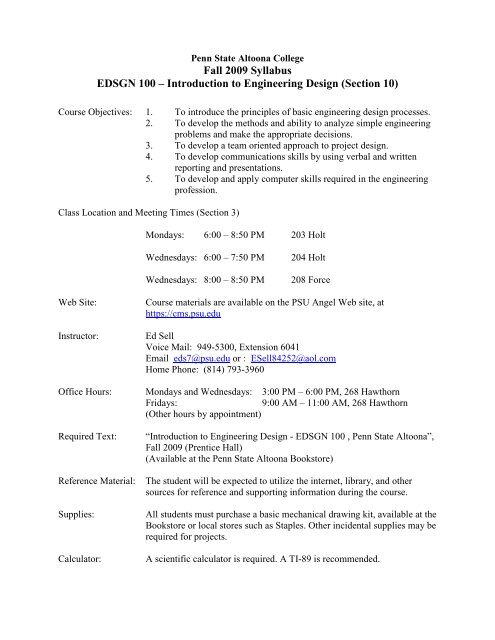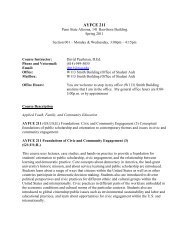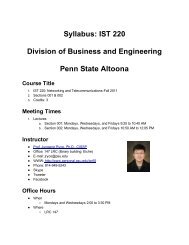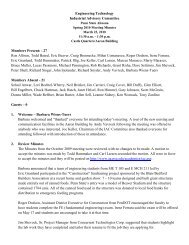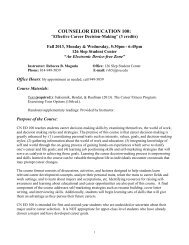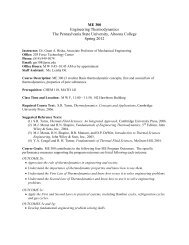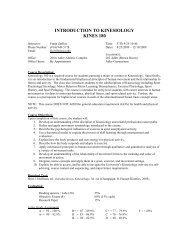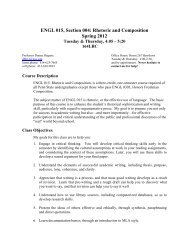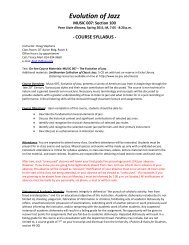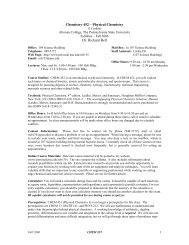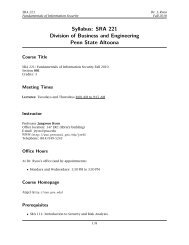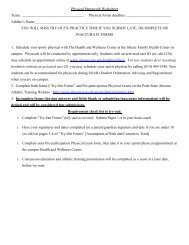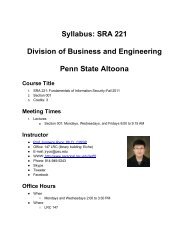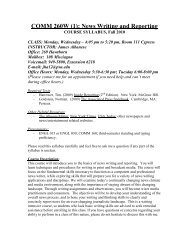edsgn 100 - Penn State Altoona
edsgn 100 - Penn State Altoona
edsgn 100 - Penn State Altoona
Create successful ePaper yourself
Turn your PDF publications into a flip-book with our unique Google optimized e-Paper software.
<strong>Penn</strong> <strong>State</strong> <strong>Altoona</strong> CollegeFall 2009 SyllabusEDSGN <strong>100</strong> – Introduction to Engineering Design (Section 10)Course Objectives: 1. To introduce the principles of basic engineering design processes.2. To develop the methods and ability to analyze simple engineeringproblems and make the appropriate decisions.3. To develop a team oriented approach to project design.4. To develop communications skills by using verbal and writtenreporting and presentations.5. To develop and apply computer skills required in the engineeringprofession.Class Location and Meeting Times (Section 3)Mondays: 6:00 – 8:50 PM 203 HoltWednesdays: 6:00 – 7:50 PMWednesdays: 8:00 – 8:50 PM204 Holt208 ForceWeb Site:Instructor:Course materials are available on the PSU Angel Web site, athttps://cms.psu.eduEd SellVoice Mail: 949-5300, Extension 6041Email eds7@psu.edu or : ESell84252@aol.comHome Phone: (814) 793-3960Office Hours: Mondays and Wednesdays: 3:00 PM – 6:00 PM, 268 HawthornFridays:9:00 AM – 11:00 AM, 268 Hawthorn(Other hours by appointment)Required Text:Reference Material:Supplies:Calculator:“Introduction to Engineering Design - EDSGN <strong>100</strong> , <strong>Penn</strong> <strong>State</strong> <strong>Altoona</strong>”,Fall 2009 (Prentice Hall)(Available at the <strong>Penn</strong> <strong>State</strong> <strong>Altoona</strong> Bookstore)The student will be expected to utilize the internet, library, and othersources for reference and supporting information during the course.All students must purchase a basic mechanical drawing kit, available at theBookstore or local stores such as Staples. Other incidental supplies may berequired for projects.A scientific calculator is required. A TI-89 is recommended.
Expectations:In this class we will be applying the engineering design process to onemajor project and several mini-projects. You will need to work in teamssuccessfully and communicate with other students and instructors ondifferent levels. We will learn how to communicate with drawings andgraphics, computer tools, and through various oral presentations.Individual work as well as working effectively as a team member will beconsidered towards your grade for the course.Explanation of work, individual assignments and grade distribution:The work in EDSGN <strong>100</strong> is broadly divided into three categories• Team projects and design.Included in this category will be study and assignments concerningbasic engineering design. Several mini-projects will be developedwhich will require some research, development and presentationand a final design project will be assigned. This category will alsoinclude discussions and presentations regarding engineering ethics,preparation of resumes, different engineering majors, etc.• Mechanical drawing, working with prints, spreadsheets, and presentations.This category will include the development of basic mechanicaldrawing skills, working with spreadsheets including graphing,working with manufacturing prints, power point presentations, anddevelopment of other basic engineering skills.• Computer drawing and modeling including AutoCAD and Solid Works.Considerable time will be spent in developing skills to preparecomplex engineering computer drawings with AutoCAD. Alsoincluded in this category will be an introduction to threedimensional modeling using Solid Works software.The work in all of the categories will consist of numerous class assignments, miniprojects,homework assignments, class presentations, etc. Each assignment and projectwill be graded. The final grade for the course will be determined as follows:Average of all mini-projects, exercises, homework assignments, etc. 70%Major project grade: 20%Attendance and participation: 10%Grading Policy: A 93 and above B- 80-82A- 90-92 C+ 75-79B+ 87-89 C 70-74B 83-86 D 60-69F Less than 60
Attendance:Conduct:Attendance is necessary in order to maintain continuity in this course.Students who attend all of the classes will gain the maximum benefit fromthis course. There will be no class time available to cover materialmissed because of absence. Students who miss classes are responsible forthe material covered during their absence and must contact the instructorto discuss the situation. Failure to show up for an exam, exercise, project,or quiz will result in a grade of zero for that class period unless theinstructor is presented with a legitimate reason for the absence.Tardiness is disruptive to others in the class and is not acceptable.Habitual lateness to class will result in a grade penalty.Late homework and projects will also receive a grade penalty.Your conduct is governed by the “<strong>State</strong>ment on Academic Integrity”which follows. Academic dishonesty includes, but is not limited to,cheating, plagiarizing, fabricating of information, facilitating acts ofacademic dishonesty of others, having unauthorized possession ofexaminations, submitting work of another person of work previously usedwithout informing the instructor, or tampering with the academic work ofother students.<strong>Penn</strong> <strong>State</strong> <strong>Altoona</strong>'s statement on academic integrity is as follows:<strong>State</strong>ment on Academic IntegrityDefinition and ExpectationsAcademic integrity is the pursuit of scholarly activity in an open, honest and responsible manner.Academic integrity is a basic guiding principle for all academic activity at The <strong>Penn</strong>sylvania<strong>State</strong> University, and all members of the University community are expected to act in accordancewith this principle. Consistent with this expectation, the University's Code of Conduct states thatall students should act with personal integrity, respect other students' dignity, rights andproperty, and help create and maintain an environment in which all can succeed through thefruits of their efforts.Academic Integrity includes a commitment not to engage in or tolerate acts of falsification,misrepresentation or deception. Such acts of dishonesty violate the fundamental ethicalprinciples of the University community and compromise the worth of work completed by others.To protect the rights and maintain the trust of honest students and support appropriate behavior,faculty and administrators should regularly communicate high standards of integrity andreinforce them by taking reasonable steps to anticipate and deter acts of dishonesty in allassignments. At the beginning of each course, it is the responsibility of the instructor to providestudents with a statement clarifying the application of University and College academic integritypolicies to that course.
Consequences of Academic DishonestyThe penalty for academic dishonesty in less serious cases may consist of a failing grade for thecourse. The decision is made by the instructor. In more serious cases of academic dishonesty, thepenalties may be more severe, including automatic failure for the course, and referral to theOffice of Judicial Affairs for disciplinary action. Formal due process procedures are availablefor the students and faculty involved. The Student Guide to University Policies and Rulesprovides the details on these procedures.Assignments:Class cancellations:Course Outline:Final Exam:Course Help:Cell Phones:In this course, there will be both individual and team assignments.Individual assignments must be done and turned in by each studentindividually. For the team assignments every person is expected tocontribute to the assignment as equally as possible. A “team leader” willbe designated for each group assignment. That person will be responsiblefor organizing and dividing the work and assuring that the work iscompleted on time.Due to the unpredictability of the weather, check ANGEL, the classcancellation system, or my voice mail for cancellations or delays. Thelocal news media also provides updates during severe weather.Homework and quizzes due for a class that is canceled will immediatelybe due the next class period.A tentative course outline and schedule will be furnished separately. Thecourse outline (and Syllabus) will also be available on the Angel website.Satisfactory completion of the major project will essentially constitute thefinal exam in this course.Tutoring help is available through the <strong>Penn</strong> <strong>State</strong> <strong>Altoona</strong>’s LearningResources Center. If additional help is required in this course discuss withthe instructor or contact the learning resource center at:www.altoona.psu.edu/lrc.All cell phones must be turned off during class, including the informalproject work sessions. It is unacceptable to make or receive calls duringany of the class periods. Violations will result in a 10% deduction from theclass exercise or project grade for that session.Note:This syllabus is subject to change at the discretion of the instructor.


